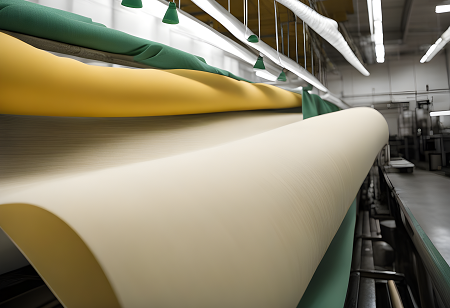
As sustainability becomes a crucial attribute in the changing stance of textile industry, biodegradable fabrics market is undergoing considerable growth. This transition is also being fueled by the increasing orientation of customers towards eco-friendly alternatives. Produced from natural sources, biodegradable textiles are proving to be the ideal solution for the textile industry to reduce the environmental footprint. Moreover, the adoption of new technologies in dyeing processes and production is making such fabrics appealing and durable. Considering the pace at which its production is increasing, it is bound to reshape the textile industry.
Let us have a look at how this paradigm shift is unfolding in the textile industry and how it is impacting the business operations of textile manufacturers.
One of the foremost areas witnessing a change as an aftereffect of biodegradable fabric production is the shift in sourcing. Building new partnerships with sustainable material providers is going to be a prerequisite for textile manufacturing. These partnerships are becoming crucial for sourcing from renewable and eco-friendly sources like organic cotton. Manufacturers need to be careful about the selection of raw materials and they must also weigh the partnership with suppliers on the grounds of adherence to environmentally responsible practices. Hence, the supply chain is gradually embracing sustainable sourcing, which shows both the industry’s commitment and imperative.
One example of a textile manufacturer sourcing from renewable and eco-friendly sources is Patagonia, an outdoor apparel company. It sources organic cotton from verified and certified organic farms, primarily in the United States and other parts of the world. This organic cotton is grown using eco-friendly farming practices that eliminate the use of synthetic pesticides and genetically modified seeds. Instead, the cotton is cultivated using natural fertilizers and non-GMO seeds, reducing its environmental impact.
Biodegradable fabric manufacturing is pioneering a shift towards minimized chemical usage in the textile industry. Unlike traditional fabric production, which often relies on an array of synthetic chemicals and harsh dyes, the creation of biodegradable fabrics, such as organic cotton, emphasizes eco-friendly processes. These fabrics are typically cultivated or processed with fewer chemicals, pesticides, and synthetic additives. This reduction in chemical usage not only benefits the environment by minimizing pollution and toxic residues but also enhances the safety of workers in the production chain. Biodegradable fabric manufacturing exemplifies a sustainable approach that prioritizes both environmental and human well-being while delivering high-quality, eco-conscious textiles.
Austrian company Lenzing AG employs an innovative closed-loop manufacturing process in the production of biodegradable fabric - Tencel. In this process, nearly all the solvents and chemicals used in the production are captured, treated, and recycled, minimizing the environmental impact. Compared to traditional fabric manufacturing, where chemicals are often discharged into the environment, the closed-loop system significantly reduces chemical waste and pollution.
Textile manufacturers are rapidly adopting new technology for biodegradable fabric production, revolutionizing the industry. Advanced machinery and innovative processes enable the efficient conversion of sustainable materials like organic cotton or Tencel into eco-friendly textiles. Cutting-edge dyeing techniques reduce water and chemical consumption, minimizing the environmental impact. Automation and digital tools optimize production, improving precision and reducing waste. Moreover, blockchain technology is enhancing transparency, allowing consumers to trace the origins of biodegradable fabrics. These technological advancements not only align with sustainability goals but also address the growing demand for eco-conscious products, marking a pivotal shift in the textile manufacturing landscape towards more responsible and efficient production.
Spinnova, a Finnish materials innovation company has developed a groundbreaking sustainable technology for creating biodegradable fabrics. H&M partnered with Spinnova to integrate the innovative technology into its textile production processes. Spinnova's technology allows for the creation of textile fibers from renewable materials like wood pulp without using harmful chemicals. The process is water-efficient and significantly reduces the environmental impact compared to traditional textile manufacturing.
“The rise of sustainable clothing has gained popularity among Indian consumers, with a growing interest in ethical and eco-friendly fashion brands. These brands embody the spirit of positive change and responsible consumerism, appealing to those who value sustainability, quality, and durability over fleeting fashion trends,” says Shreya Ghodawat, Founder & CEO, Sustainable Guides.
The future of biodegradable fabric production promises to deeply impact the business operations of textile manufacturers. With sustainability at the forefront, the industry will witness a fundamental shift towards reduced chemical usage, eco-friendly sourcing, and responsible manufacturing processes. Textile manufacturers will increasingly invest in innovative technologies and materials that lower their environmental footprint, thereby aligning with growing consumer demand for eco-conscious products. Circular fashion practices will gain prominence, with an emphasis on recycling and upcycling biodegradable textiles. Collaborations with sustainable material providers and a commitment to transparency will reshape supply chains. In essence, biodegradable fabric production will drive a sustainable revolution, redefining textile manufacturers' operations and values.
We use cookies to ensure you get the best experience on our website. Read more...